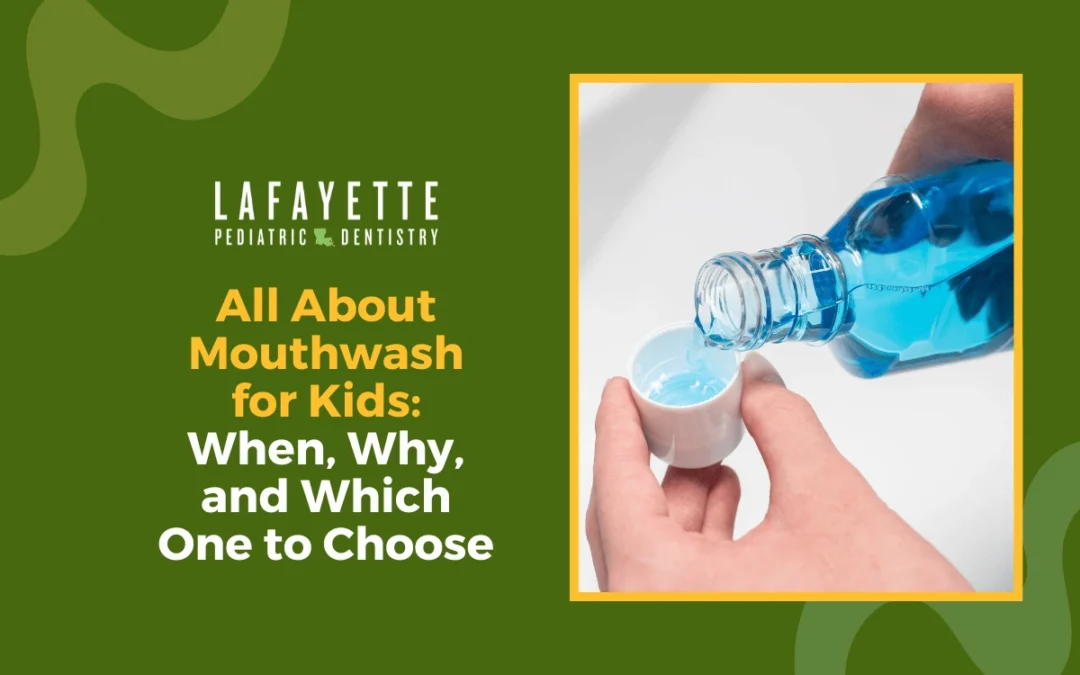You’re standing in the oral care aisle, staring at rows of colorful bottles, wondering if your kid really needs mouthwash. Is it safe? Is it just another marketing gimmick, or does it actually help?
Figuring out kids’ dental care can get a little overwhelming, especially when every product promises to be the “best” or “most essential” thing for your child’s teeth.
Mouthwash can be a helpful add-on to your kid’s oral care routine, but it’s not some magic fix, and it’s definitely not a must-have for every child.
In this post, we’ll break down when kids should start using mouthwash, why it might be worth considering, and how to pick one that won’t just sit there gathering dust on the bathroom counter.
When Should Kids Start Using Mouthwash?
The ADA recommends that kids shouldn’t start using mouthwash until they’re at least 6 years old unless directed by their dentist. Why 6? That’s typically the age when most kids have enough coordination and understanding to swish and spit without swallowing too much of it.
But every child is different. Some 5-year-olds might be ready, while others may need to wait until they’re 7 or 8. If they’re still working on spitting out toothpaste or tend to swallow what’s in their mouth, it’s better to hold off on mouthwash for now.
Why Use Mouthwash for Kids?
Extra Protection
Mouthwash is not a replacement for brushing and flossing. We can’t stress this enough. It’s more like an extra layer of protection after you’ve already done the main work of cleaning those teeth.
That being said, mouthwash can provide some real benefits as part of a comprehensive oral care routine. It reaches places that brushing might miss, especially those tricky back molars where cavities love to form. The liquid can swish around and get into tiny crevices that even the best brushing technique sometimes misses.
Fluoride for Cavity Prevention
Many children’s mouthwashes contain fluoride, which strengthens tooth enamel and makes it harder for bacteria to cause decay. This is particularly helpful if your child is prone to cavities or if you live in an area like Lafayette, where the drinking water doesn’t contain fluoride.
Read more: Tips for Keeping Your Child Cavity-Free
Helps with Bad Breath
Kids aren’t always the most thorough brushers, and sometimes that morning breath lingers longer than we’d like. A quick swish of mouthwash can help freshen things up.
However, if bad breath sticks around even with good oral hygiene and mouthwash, there might be an underlying issue that needs to be checked out by a dentist.
Read more: What to Do If Your Child Has Bad Breath
Why Mouthwash Might Not Be All That Necessary for Your Child
It Can be Unpleasant for Some Kids
Some kids find the taste or sensation of mouthwash too strong, even with the milder versions. If using it leads to daily resistance or turns oral care into a struggle, it may end up doing more harm than good. A good brushing and flossing routine, along with regular dental checkups, is really the foundation of healthy teeth.
Mouthwash isn’t Always Easy for Kids with Special Needs
Children with special needs might also have a harder time using mouthwash. Swishing and spitting can be challenging for those with developmental disorders, sensory sensitivities, or motor skill difficulties.
For some, the texture or flavor can be overwhelming. In these situations, it’s often more helpful to focus on brushing and flossing rather than adding another step to an already complex routine.
Your Kid Already Gets Enough Fluoride
If your child is already getting fluoride from sources like toothpaste and beverages, adding a fluoride mouthwash might not be necessary.
What to Look for in a Kids’ Mouthwash
Choose Alcohol-Free Options
Alcohol-free is a must. A lot of mouthwashes contain alcohol, which can be too harsh and leave a burning feeling. Look for brands like ACT that make alcohol-free options specifically for children.
Fluoride: Yes or No?
If your kid’s already getting enough fluoride through toothpaste and bottled beverages, including bottled water, then a fluoride-free mouthwash might be totally fine. But if they are lacking in their fluoride intake, a fluoride mouthwash can really help.
Flavor Matters Too
You could buy the most dentist-approved, scientifically-backed mouthwash out there, but if your kid hates the taste, they’re not going to use it. Most kids’ mouthwashes come in flavors like bubblegum, berry, or mild mint. Let your kid pick the one they like because they’re way more likely to actually use it if they had a say.
How Often Should Your Child Use Mouthwash?
Using mouthwash once a day is usually enough for most kids unless your dentist recommends more. As for when to use it, morning or night both work fine. But we’ve found that adding it to the bedtime routine often works better since kids tend to be less rushed then.
Keeping up with good habits like mouthwash is just one part of your child’s oral care. Another key step is building a dental home for them early on.
A dental home offers consistent, comprehensive care and helps your child build a positive attitude toward dental visits from an early age.
If you’re in Lafayette, Youngsville, Broussard, Breaux Bridge, or anywhere in the greater Acadiana area and are searching for a local pediatric dentist for your family, look no further.
Our practice is dedicated to making dental visits comfortable and stress-free for kids, while also giving parents the tools and guidance they need to maintain their child’s oral health at home. Give us a call if you have any questions or to set up an appointment!
